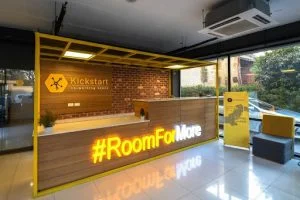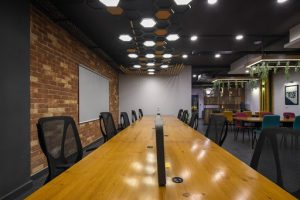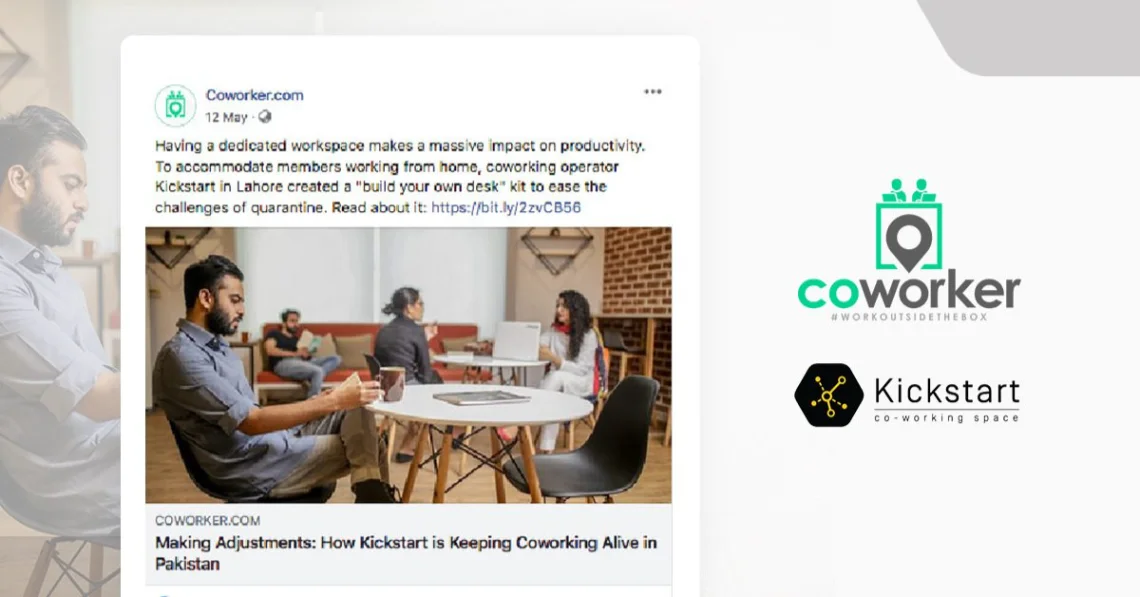After graduating from college, Saad Riaz and his friends were in the market for office space. However, there weren’t many decent spaces in Lahore that were reasonably priced, which led to Riaz wondering how he could bridge the gap between living communally and working in a shared setting.
In 2016, Riaz and his co-founder launched Kickstart. In those days, Kickstart was one of the very first coworking spaces in Lahore. Now, the flexible office industry in Pakistan is rapidly expanding, with over 51 coworking spaces now available in Lahore alone.
Coworker caught up with Saad Riaz, Co-Founder at Kickstart, to learn a little more about the industry for shared office space in Pakistan and the reasons why Kickstart has been a game-changer during the COVID-19 pandemic for members.

1) First and foremost, what do you love about coworking and why is it important to you as a co-founder?
While establishing our first Kickstart coworking space, we were coming from a background of our own difficulties of starting a business in Pakistan. At that time, Pakistan was ranked 144 among the 190 economies by the Worldbank in their ease of doing business index.
Our mission was therefore very personal, and it was crystal-clear from day one: Kickstart makes it easy for others to do business in Pakistan. Be it by providing cost-effective and hassle-free office facilities or by creating a community of a dynamic group of people who could help each other grow, this mission is what matters most.
Over the past four years, we have seen many members partnering with each other and forming new companies. That is something that motivates us to keep going.

2) In light of recent global events, what initiatives did Kickstart put in place as a way of responding to members’ changing needs?
When our members couldn’t come to the office anymore, we started thinking about how can we help them do business at home. We had conversations with some members and learned that they were struggling to do occasional chores related to business.
In coworking spaces in South Asia, we have a lot of ‘Office Boys’ who aid members in office chores. Since the spaces are closed, we converted them to Riders so they could help members do these types of tasks from home.
Since we have launched this service, our riders have carried out tasks like depositing checks, collecting cash, delivering laptops to new hires, collecting laptops and other office equipment from laid-off employees, and even paying bills.
Around 65% of our members have used this service in some way and have really appreciated it. The service was particularly useful here since there is a lot of room for digitization in Pakistan. At present, there are still a lot of tasks that require people to go outside.
During our conversations with members, we also learned that an overwhelming amount (60%) of them do not have a proper desk at home. Most of them worked on a sofa or a dining table. So our team quickly ideated and developed a Build Your Own Desk kit.

The desk is not a substitute for a wooden desk, but it is an excellent value-addition for quarantine days. We have kept it cost-effective so that everyone can benefit from it. Our customers encouraged us a lot on this. They are enthusiastically sharing feedback and we are improving the kit.
3) Why do you think these new initiatives have been successful?
Our customers found great utility in these initiatives; however, they loved the intent even more. Adopting and conveying a collaborative mindset is very important in moments of crisis. Through these initiatives, we conveyed a message that we are here for them at this moment and trying our best to provide services in changing times.
4) What other strategies or business practices will you adopt as members begin returning to work?
A members start coming back to the office, we are keeping a laser-sharp focus on one specific area: safety and hygiene. We are looking at the problem from behavioral and architectural angles.
From the behavioral point of view, we have changed the entire facility management operation to minimize contact and maintain distance. We put the basic safety measures in place a couple of weeks ago and started training staff on those measures. These included thermal scanning and hand sanitization at the entrance, provision of hazmat suits for the temperature scanning and disinfection staff, disinfection of all accessible areas after every 30-minutes, and deep disinfection of the space every day. Everybody has to wear a mask inside the spaces at all times, be it our staff or members.
We also keep a detailed record of entrance and exit timing of different members to determine overlap of any particular member with other members.

We have also modified the entire service-structure to minimize contact. We have dedicated staff in our pantries who carry out special hygiene procedures. They are the only people who touch the crockery and coffee machines, so they are the ones brewing the coffee and members can then come to pick it up.
We are tagging all hand-accessible areas with red tags so that our members have an accurate perception of risk at all times. The tags will also remind our staff that they have to disinfect high-risk areas every 30 minutes. Similarly, the seats will also be tagged as red and green to show members where they can and can’t sit to maintain the required distance. The dining area capacity will be cut to 40% of what it was before coronavirus.
There are many other measures that we are implementing along these lines. We are very clear that health and safety will be our core focus for 2020.
5) How has the current pandemic affected your operations? What else has Kickstart done to engage your members, even from afar?
The pandemic has turned the great coworking USP of interaction and community to something harmful and risky — at least for the time being. Even after the resumption, we don’t see any events and get-togethers in the near future.
To keep a sense of community alive, we are soon launching video rooms within our member web app. The app will have virtual meeting rooms and other areas named after our physical rooms. The idea is to encourage members to cut back on in-person meeting room usage wherever possible while keeping a sense of community alive by carrying the association of community from physical areas into virtual space.

6) What do you think the future holds for coworking and remote work? What is the situation in Pakistan currently like?
At the start of 2020, we predicted that the year would see a phenomenal rise of coworking spaces and flexible offices in Pakistan. But the expansion plans have been delayed due to coronavirus, and the focus is entirely shifted to making our existing spaces safe for members.
More people are definitely going to shift to remote work post-COVID-19. However, they might still keep coming to coworking spaces. We have a lot of members who work remotely for companies in other countries with no compulsion from employers to use coworking spaces, but they do so because of different reasons.
Originally published in Coworker Mag: https://www.coworker.com/mag/kickstart-coworking-pakistan

